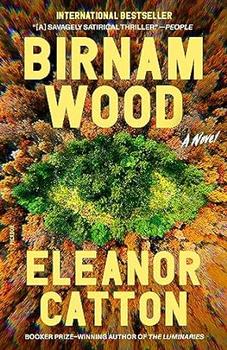Summary | Excerpt | Reading Guide | Reviews | Beyond the Book | Readalikes | Genres & Themes | Author Bio

A Novel
by Eleanor Catton
Except she wasn't, because she had treated Shelley badly, and now Shelley wanted out – and Mira found herself, as she had with her parents' separation, in a situation where her most cherished and most practised social skills were simply of no use. Debate was worthless, the exercise of charm beside the point; and having committed, long ago, to the performance of a mature and self-sufficient rationality, she now found herself without either the language or the power to express how deeply she was grieving. She wished more than anything that she could reverse her course, convey more gratitude and sympathy, show more interest in Shelley's inner life, confess, as she could still barely confess to herself, that the air of fearless self-assurance she projected was merely an imposture, a front designed to ward off intimacy and to banish her immense uncertainty and moral guilt. She wished that she could tell her friend the honest truth, which was not that she loved her because she needed her, but that she needed her because she loved her, and in her monumental stupidity and self-absorption, she had only just figured that out. Mira disliked to feel that she was wallowing; she tended to follow moments of severe self-criticism with rapid and decisive action. She had come home intending to suggest to Shelley that they drive down to Thorndike on the weekend, a five-hour trip that would take them well outside their usual sphere of operation and afford them both a healthy change of scene. Cycling back to the flat that afternoon, she had imagined describing to Shelley what a single season at the Darvish farm could do for Birnam Wood, had envisaged Shelley's excitement at the prospect of the trip, had conjured, in her mind's eye, the conversation that in recent weeks had become a persistent and increasingly alluring fantasy: Shelley confiding, with none of the fatigued apprehension or forced politeness that had dogged her manner lately, that she had been on the verge of leaving, but this – Mira had auditioned many schemes for 'this' – had changed her mind. Now, standing in the kitchen with her phone loose in her hand, Mira rebuked herself again for having indulged in such craven wishful thinking. She told herself, sternly, that Shelley needed space – and then resolved, immediately, to be the one to give it to her. Even before she had fully voiced the thought, she was decided. She would go to Thorndike alone, at once, tonight; she would scope out the farm; she would give Shelley a few days to relax and hopefully to reconsider; and she would come back having killed two birds, as it were, with one stone. She kicked off her shoes and went into her bedroom to pack.
One of the reasons that horticulture held such strong appeal for Mira was that it offered her a respite from this habit of relentless interior critique. When she made things grow, she experienced a kind of manifest forgiveness, an abiding moving-on and making-new that she found impossible in almost every other sphere of life. Even in her failures and mistakes – as when she learned that onion seeds don't tend to keep, or that low soil temperatures result in carrots that are pale, or that fennel inhibits growth in other plants and should be propagated only on its own – she never felt chastised, for truth, in a garden, did not take the form of rectitude, and right was not the opposite of wrong. To learn even something as simple as to water the roots of a plant rather than its leaves was not to be dealt the harsh reality of cold hard fact, but rather to be let into a secret. In a garden, expertise was personal and anecdotal – it was allegorical – it was ancient – it had been handed down; one felt that gardeners across the generations were united in a kind of guild, and that every counsel had the quality of wisdom, gentle, patient, and holistic – and yet unwavering, for there was no quarrelling with the laws and tendencies of nature, no room for judgment, no dispute: the proof lay only in the plants themselves, and in the soil, and in the air, and in the harvest.
Excerpted from Birnam Wood by Eleanor Catton. . Published by Farrar, Straus and Giroux. Copyright © 2023 by Eleanor Catton. All rights reserved.
Your guide toexceptional books
BookBrowse seeks out and recommends the best in contemporary fiction and nonfiction—books that not only engage and entertain but also deepen our understanding of ourselves and the world around us.